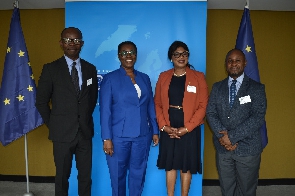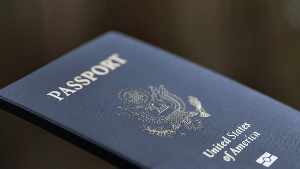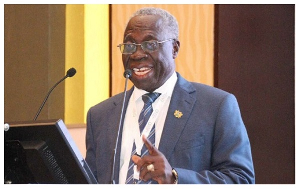Ghana took a significant step towards strengthening its cybersecurity infrastructure by signing the Council of Europe’s Second Additional Protocol to the Convention on Cybercrime (Budapest Convention).
Ghana ratified the Budapest Convention in April 2019 and is one of six African countries to do so.
On Wednesday, June 28, 2023, the Minister for Communications and Digitalisation, Ursula Owusu-Ekuful, signed the protocol on behalf of Ghana at the Council of Europe Headquarters in Strasbourg, France.
Ghana is the second African country, following Mauritius, to sign the protocol.
In her opening remarks, Ursula Owusu-Ekuful expressed Ghana’s appreciation to the Council of Europe for its relentless efforts towards a global response to cybercrimes through strengthening international cooperation and providing an opportunity for Member States to work together effectively.
She applauded the Council for the recent workshop and public consultation held on June 8 and 9, 2023, in Ghana, which created the platform for relevant stakeholders to deliberate and obtain a better understanding of the principles of the Protocol.
The Minister bemoaned that since the powers of officials in the criminal justice sectors are limited by territorial boundaries, only a few cybercrime cases are reported to criminal justice authorities, leading to criminal justice actions.
She, however, revealed that “the protocol responds to these challenges by providing the tools for enhanced co-operation and disclosure of electronic evidence.”
She further explained that “the adoption of the protocol will strengthen cybercrime investigation efforts and lead to more adjudication of cybercrime cases, globally”.
The Minister, who was accompanied by the Director-General of the Cyber Security Authority (CSA), Dr Albert Antwi-Boasiako, and the Ag. Director, Capacity Building and Awareness Creation, at the CSA, Alexander Oppong, pledged Ghana’s commitment to taking the “necessary steps toward the full implementation of the articles in the protocol and will continue to count on the Council of Europe on this partnership”.
The brief ceremony also witnessed the signing of the Protocol by Hungary. Cabo Verde, signed the amending protocol to the convention for protection of individuals on Personnel Data as well as the Second Additional Protocol as Slovak Republic, also deposited the instrument of ratification of the First Additional Protocol.
Ghana's designation as a hub country under the Global Action on Cybercrime Enhanced (GLACY-e) project highlights its role as a leader in cybersecurity. Ghana is one of the three hub countries in Africa, the others being Senegal and Mauritius, in recognition of its prior engagement with the GLACY+ project. The Project is an extension of the Global Action on Cybercrime Extended (GLACY+) Project, with a projected duration of 30 months, from August 2023 to January 2026.
As a hub country, Ghana will spearhead training programmes for law enforcement agencies, conduct case simulation exercises, organise awareness workshops, and share best practices at regional and international levels.
Through its involvement in the GLACY-e project, Ghana will gain access to targeted advice on training strategies.
By signing the protocol and assuming the role of a hub country, Ghana reaffirms its commitment to combatting cybercrime, protecting its citizens, and fostering international cooperation.
These efforts align with Ghana's vision to establish a secure and resilient digital ecosystem, safeguarding its citizens and fostering economic growth in the digital age.
General News of Tuesday, 11 July 2023
Source: Cyber Security Authority

















